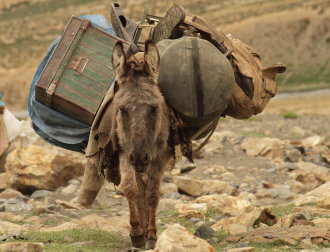Don't kill the donkey
16.07.-26.07.2010: Trekking to Zanskar-Valley

Imagine, you are lying in your tent, at 4.600m in the base camp of Sengge La. You are packed in your sleeping bag and it is darkest night.
There is complete silence, nothing to hear except of the river with lots of glacial water spilling down the valley.
And you hear yourself breathing slow and steady. You are feeling good, although the altitude is something special for you.
And all of a sudden your heart almost stops. It's not the altitude, which takes your breath, but short heartbreaking screams.
You sit just upwright in your tent (if the tent is high enough) and now you recognize the sound. It's the screaming of a donkey, which
explodes into the silence.
Somebody must be killing a donkey just next to our tent. It couldn't be anything else, could it!
This donkey was killed about 10 times this night. But in the morning it was still alive.
What made this donkey screaming like hell?
It soon was quite clear - The donkey was just terribly alone. The donkey men had fixed him right next to our tent to a pole, while
his fellows were grasing in the area.
Some days later we meet the poor donkey again. This time also fixed alone on an isolated range.
We think the donkey had problems with his hormons. When near female donkeys he could be very pushy and also could be screaming
even louder.
